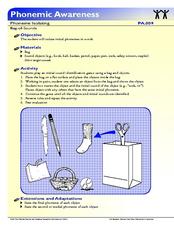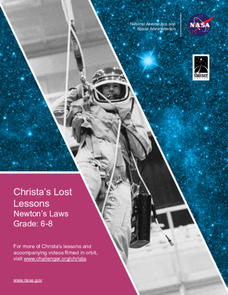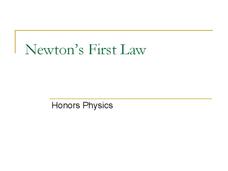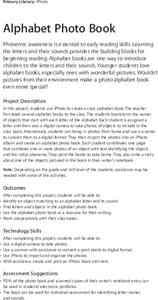Florida Center for Reading Research
Phonological Awareness: Phoneme Isolating, Bag-of-Sounds
In pairs, pre-readers take turns holding up objects from a bag. As one child holds up an object, the other names it and says its initial letter sound. They work together to sort the objects into piles based on how they isolated and...
NASA
Christa's Lost Lesson: Newton’s Laws
How do the laws of motion work in space? Learners explore Newton's laws of motion in different experiments as part of the Christa's Lost Lessons series. They rotate around the room in three stations to experience each law in action using...
Curated OER
Simple Machines III - Pulleys
The principles behind pulleys, levers, and simple machines are the focus of a science lesson. In it, learners take part in a whole-class activity. There are two groups of pupils who each must lift objects with fixed pulleys and multiple...
Curated OER
From Curiosity Cabinet to Museum Collection
Students study binomial nomenclature and museum-based research. They create a curiosity box, label the objects in their curiosity box , develop a classification scheme for the objects, and create a database of all objects collected by...
Exploratorium
Parabolas
A parabolic mirror toy demonstrates how concave mirrors objects reflect light and produce a realistic image at their focal point. This resource probably doesn't explain any more than the printed insert that accompanies such an apparatus...
InqueryPhysics
Interpreting Motion Graphs
Every movement in the world can be measured and even motionless objects can be significant indicators of movement. Focus on motion graphs that feature distance vs. time, speed vs. time, and positive and negative acceleration.
It's About Time
Conservation of Momentum
Assist your class with understanding collisions as they apply the Law of Conservation of Momentum. Pupils measure the momentum before and after manipulation of two objects so that one strikes another in an inelastic collision. The lesson...
Curated OER
We're Off To the Races!
Second graders use a magnet to "race" objects from one side of a racing track to another. They predict what the results are, then run the race. Pupils sort and graph which items were successfully moved, they attempt to race again. This...
Florida Center for Reading Research
Phonological Awareness: Phoneme Matching, Sound Train
Make a phonics train filled with matching initial phonemes. Early readers say the name of the objects on each of their cards, identify the initial letter sounds or phonemes, then paste them on a train. They make three trains, which means...
Curated OER
Counting Mat
Using the provided counting mats (1-6 and 7-12) and small objects to count with, guide your young learners to match the correct number of objects to the written numeral and dots. Class members will either read the numeral and count out...
LABScI
Kinematics: The Gravity Lab
Falling objects can be brutal if you don't protect your noodle! Scholars explore the motion of falling objects through measuring short intervals to determine if the distance traveled varies with time. Building off of this, scholars...
Big Kid Science
Measuring Shadows Using an Ancient Method
How did ancient peoples determine the height of really tall objects? Young scientists and mathematicians explore the concept of using shadows to measure height in a hands-on experiment. Paired pupils measure shadows, then calculate the...
Teach Engineering
Determining Densities
Don't be dense—use a robust resource. The second installment of a five-part Floaters and Sinkers unit has learners determine the densities of several objects. As part of the activity, they learn the displacement method for finding...
Curated OER
Sink or Float?
Have your class explore density and buoyancy using this resource. Learners read the book Who Sank the Boat, and use several items, such as rubber balls, bottle caps, wood, and other household items to conduct an experiment. Using a tub...
Curated OER
The Search for Centimeters
Investigate the length of various objects in metrics! In this measurement lesson, 2nd graders estimate and find the length of objects in the classroom using centimeters.
Curated OER
Light
Here is a stellar slide show for illuminating middle schoolers' minds on the topic of light! An interactive slide allows viewers to sort light sources by whether or not they are man-made. More objects are displayed and learners discover...
Curated OER
Force Problems
Who knew F=MA could determine the force of a free-falling elevator? Give your class this set of thirteen word problems for practice determining force, mass, and acceleration of everyday objects. One question introduces an object in...
Curated OER
Mass vs. Weight
Why do you weigh more in space? Each individual in your class explores this question and others as they determine the mass and weight of different objects using two types of scales. They perform conversions and discuss their...
Curated OER
A Moving Experience - Forces and Inertia
Young scholars consider the first part of Newton's First Law of Motion, the Law of Inertia of objects at rest, which states that every object remains at rest unless acted on by a force. They perform hands-on experiments which demonstrate...
Curated OER
Practice Using a Ruler
In this using a ruler worksheet, students utilize a ruler to measure the length of four objects and then choose four small objects from their desk to outline and measure.
Florida Center for Reading Research
Phonological Awareness: Phoneme Matching, Sound Bags
Peers pair up to find, identify and match medial phonemes. Peer one pulls a card or object from a bag, names it, then says its medial sound.—peer two attempts to find a picture or object whose medial sound matches the partner.
Bowels Physics
Newton's First Law
Force acts on objects in mysterious ways ... until now! A comprehensive presentation explains the balance of forces acting on objects. Learners draw free body diagrams to show these invisible forces and make force calculations.
Curated OER
Alphabet Photo Book
Students use iPhoto to create a class alphabet book. After the teacher reads several alphabet books to the class, students brainstorm the names of objects that start with each letter of the alphabet.
Curated OER
Tracking Speed
Young scholars calculate the speed of an object, by measuring the amount of time it takes to cover a given distance, and then divide: speed=distance/time. However, the object may not have been moving at a constant rate over the given...
Other popular searches
- Classroom Objects
- Direct Objects
- Direct and Indirect Objects
- Classifying Objects
- Classify Objects
- School Objects
- Classroom Objects Bingo
- Indirect Objects
- 3 D Objects
- Counting Objects
- 3 Dimensional Objects
- Describing Objects























